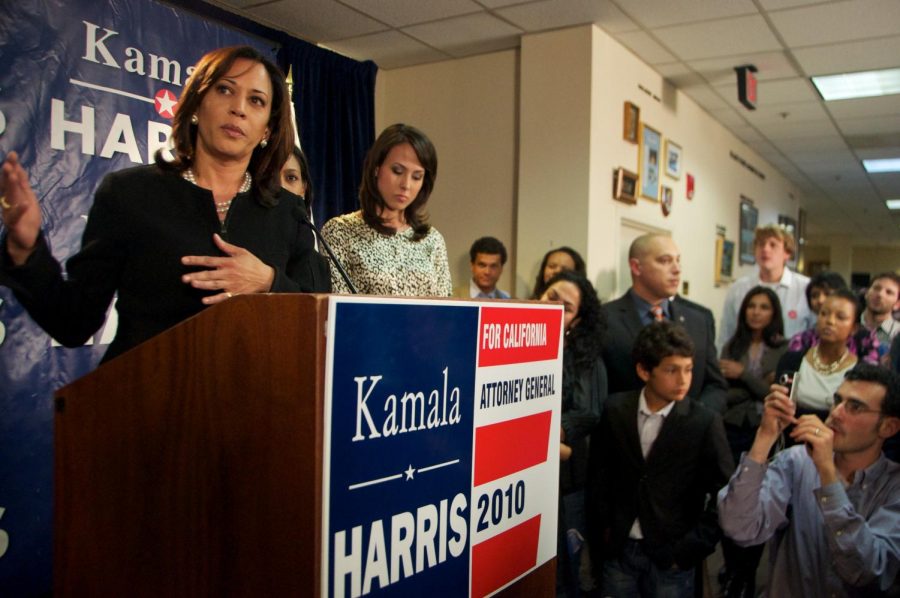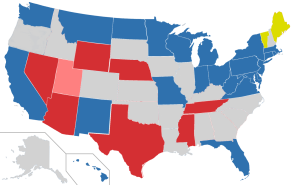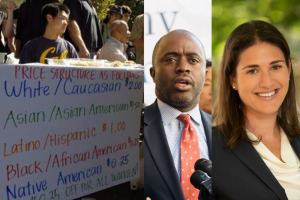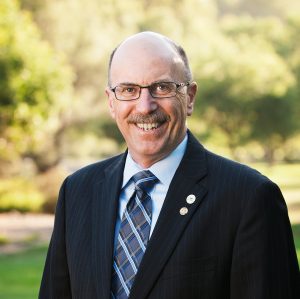Kamala Harris declares 2020 presidential candidacy, joins deep Democratic field
March 22, 2019
Running on a platform of national unity and progressivism, Sen. Kamala Harris (D-CA) formally announced her 2020 presidential candidacy on Jan. 21, entering a large field of Democratic candidates seeking to challenge President Trump.
“This is a moment in time where I feel a sense of responsibility to stand up and fight for the best of who we are,” Harris announced on ABC’s Good Morning America.
Despite only being a first-term senator, 54-year-old Harris is a rising star in the Democratic Party. Prior to joining the Senate in 2017, she was a prosecutor, served as San Francisco’s District Attorney from 2004 to 2011 and was the California Attorney General from 2011 to 2017.
Harris draws extensively from her background as a prosecutor, citing the legal battles she fought against sexual assault, crime and big business as vital experience in serving the people. In fact, her campaign slogan is “Kamala Harris For the People,” the salutation she recited in court.
Her African American and South Asian-American identity, as well as her gender, have become focal points of her campaign. Harris was the first woman and person of color to hold the District Attorney and Attorney General positions, and is the nation’s first South Asian-American senator. She hopes to make history once more by becoming the first female president, but the impact her identity will have on her campaign is not entirely clear.
“The fact that a woman of color is running for president is incredible,” junior Arshia Mehta commented. “I think representation is so important; with more diversified voices in government, different people who have encountered different struggles are represented.”
“I think [her Asian background] could definitely play against her because Asians are typically pretty set on where they vote,” senior Ryan Liu countered. “You have hardline, conservative Asian parents who are not going to change just because there’s an Indian running. Many Asian countries don’t even like each other.”
Liu also elaborated what representation means to him.
“As an Asian-American, I think it would be great to see an Asian-American president. As half black and half Asian, she is a pretty good representation of American politics. My issue with Kamala Harris is that I question if she can be president … like, can she get elected?”
Harris kicked off her campaign with a rally in Oakland on Jan. 27, drawing more than 20,000 attendees. In her speech, Harris framed her run as an effort to unify a deeply divided country.
“We are here at this moment in time because we must answer a fundamental question,” Harris said. “Who are we? Who are we as Americans? So let’s answer that question, America. We are better than this.”
She sharply criticized President Trump, from his demands for a border wall and his criticism of the media to his tax cuts on corporations and the wealthy. Most notably, she condemned his alleged collusion with Russia during the 2016 campaign.
“We have foreign powers infecting the White House like malware,” she said, evoking a deafening roar from the crowd.
“The campaign rally was a super interesting experience,” said Mehta, who attended the rally. “Her speech was incredibly powerful, and hosting the rally in her hometown was really intelligent. She’s really pushing for her campaign to be about her unique identity and how it’s shaped her views as a politician.”
Harris has outlined a wide range of policy priorities, including Medicare for All, universal pre-kindergarten, free college, promoting reproductive rights and policies to help the middle class.
One of Harris’ flagship policies is the LIFT the Middle Class Act, which would give monthly payments to middle-class families totaling $6,000 per year. She also proposed the Rent Relief Act, which would provide tax credits to families paying high rent.
Furthermore, Harris has taken a prominent stance on climate change, signing on as a co-sponsor of the Green New Deal. Modeled after President Franklin D. Roosevelt’s New Deal, which alleviated the impacts of the Great Depression, the plan proposes extensive government investment into renewable energy. Combined with other sustainable reforms, it aims to make the U.S. carbon neutral by 2030.
In a Feb. 7 blog post on Medium, Harris explained the rationale behind her decision to become a co-sponsor.
“Climate change is real, and it is an existential threat to our country,” she wrote. “The Green New Deal is a bold plan to drastically shift our country to 100 percent clean and renewable energy. We will repair our country’s crumbling infrastructure, upgrade buildings across the nation and dramatically cut greenhouse gas emissions.”
However, progressives point out contradictions in her record as a prosecutor and law enforcement official. For instance, she supported programs that employed former prisoners instead of keeping them behind bars, but as Attorney General, her office fought to release fewer prisoners. She refused to defend Proposition 8 (California’s ban on same-sex marriage) in court, yet argued to withhold gender reassignment surgery from two transgender inmates in 2015.
“I agree with these criticisms,” senior Shaheer Sandhu said, calling her lack of support for transgender inmates “inhumane.”
Harris has attempted to present herself as both a serious politician and a relatable human being. However, some of these efforts have backfired, such as when she told The Breakfast Club, a national radio show, that she smoked weed in college while listening to Snoop Dogg and Tupac, and that her family didn’t mind it due to her Jamaican heritage. The backlash was swift.
“My deceased parents must be turning in their grave right now to see their family’s name, reputation and proud Jamaican identity being connected … with the fraudulent stereotype of a pot-smoking joy seeker and in the pursuit of identity politics,” Harris’ father, Donald, said in an interview with Jamaica Global Online. “We wish to categorically dissociate ourselves from this travesty.”
Furthermore, listeners pointed out that Harris graduated from Howard University in 1986 and UC Hastings School of Law in 1989. This was several years before Tupac released his first album in 1991 and Snoop Dogg did in 1993, indicating that Harris’ recollection of these events could be flawed.
However, one of the hosts of The Breakfast Club, DJ Envy, defended Harris, tellingMSNBC, “We wanted to humanize her, not just talk about politics; talk about what she likes, what she does.”
Additionally, Liu pointed out that the issue could ultimately be a misunderstanding, as Harris could have been answering two separate questions instead of both in conjunction.
“It’s actually kind of overblown because the [first radio host] asked, ‘What songs did you like [in college]?’.. and [the second host] asked, ‘Did you smoke weed in college? Did you listen to music while smoking weed in college?’” He concluded that in his opinion, “it’s a non-issue.”
Overall, Harris’ campaign is still in the early stages, and her success is far from guaranteed, especially due to her centrism in comparison to other Democratic candidates, such as Bernie Sanders.
“I don’t think she’ll win the presidency, because she’s too [pro] establishment. Some Democrats would rather not vote or vote for Trump over voting for an establishment candidate,” Sandhu said. “However, if Harris can appeal more to progressives, she could win.”
“I think she is more of a centrist Democrat versus the more leftist and progressive Democrats,” U.S. History teacher Mr. Adam Bellows concurred. “On the left, everyone is going to say they’re progressive. I would encourage people to really sift through the noise and ask themselves, ‘What are these people’s history on these policies? Are they being cynical, or do they really want to push for them?’”
Regardless, her candidacy promises to make the election interesting, with several of the Democratic candidates jockeying for a position to challenge President Trump next November.
“If your [representative] is speaking like a progressive, you need to challenge them,” Bellows said. “You really need to bring up the facts, hold them accountable and keep our politicians from being cynical people and treating America as a bunch of naive kids. I think it will be very interesting to see what happens in 2020.”






